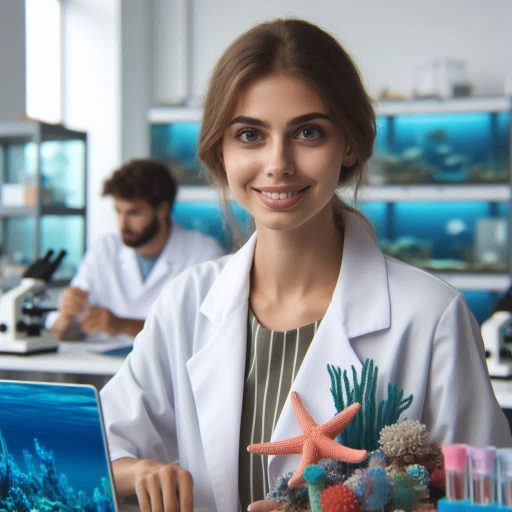Introduction
Marine biology is a dynamic and multifaceted field dedicated to studying ocean ecosystems and the diverse life forms that inhabit them.
This branch of science explores everything from microscopic plankton to the largest mammals on Earth, encompassing various disciplines such as ecology, zoology, microbiology, and oceanography.
As our oceans cover over 70% of the Earth‘s surface, the importance of marine biology cannot be overstated.
It serves as a crucial link in understanding not only marine life but also the health of our planet.
Marine biologists play a vital role in studying and conserving marine life.
They investigate complex ecological relationships, focusing on how various species interact with each other and their environments.
By examining the dynamics of these ecosystems, marine biologists can assess the health of marine habitats and identify critical issues threatening them.
Human activities, such as pollution, overfishing, and climate change, have far-reaching impacts on the delicate balance of marine ecosystems.
Understanding these effects is crucial for developing effective conservation strategies.
The work of marine biologists extends beyond research.
They actively contribute to the development of policies aimed at preserving marine environments.
Their findings help inform government regulations, fishing quotas, and marine protected areas.
By advocating for sustainable practices, marine biologists work to ensure that future generations can enjoy healthy oceans rich in biodiversity.
Lack of Funding
Marine biologists play a crucial role in understanding and preserving our oceans.
However, a significant challenge they face is a lack of funding.
Limited government funding for research significantly hampers their ability to conduct vital studies.
Budget cuts often lead to reduced financial support for oceanographic institutions.
This shortfall limits the scope and scale of essential marine research projects.
Limited Government Funding for Research
Government funding for marine research is often minimal and inconsistent.
Many marine research projects rely on public grants that face increasing budget constraints.
As governments prioritize funding for other sectors, marine research often receives less attention.
This limited funding restricts the ability to conduct comprehensive studies and gather crucial data.
The result is a diminished understanding of marine ecosystems and the challenges they face.
Competition for Grants and Scholarships
Competition for grants and scholarships adds another layer of difficulty for marine biologists.
Many researchers must vie for a limited pool of financial resources.
Each year, a growing number of applicants compete for the same grants, making the process highly competitive.
This situation can discourage innovative research ideas, as only a few projects receive funding.
Consequently, valuable initiatives may go unfunded due to resource constraints.
The reliance on grants and scholarships creates instability in marine research.
Marine biologists often face uncertainty about their future funding.
This unpredictability can deter young scientists from entering the field.
When aspiring marine biologists see limited job security, they may choose other career paths.
This trend can lead to a shortage of skilled professionals dedicated to marine conservation.
Impact on Research and Conservation Efforts
The impact of funding shortages extends beyond individual projects to affect broader conservation efforts.
Marine biologists often strive to protect endangered species and habitats.
However, without adequate funding, these conservation programs struggle to achieve their goals.
Efforts to monitor marine populations and assess ecosystem health may fall short.
The absence of funding can lead to detrimental consequences for marine biodiversity.
Limited financial support can hinder collaboration among researchers as well.
Collaborative projects often yield more comprehensive insights into marine ecosystems.
However, when funding is scarce, researchers may work in isolation, leading to fragmented knowledge.
This fragmentation limits our understanding of complex marine environments and their challenges.
Additionally, the lack of government funding affects public awareness and education.
Many marine biology projects aim to engage the public in conservation efforts.
However, limited budgets restrict outreach activities and educational programs.
Without these initiatives, public interest in marine conservation may wane, reducing support for funding marine research.
The lack of funding poses a significant challenge for marine biologists.
Limited government support, intense competition for grants, and the impact on research and conservation efforts all contribute to this issue.
Addressing these funding challenges is essential for the future of marine research.
Increased financial support can empower marine biologists to conduct vital research and protect our oceans.
Ultimately, investing in marine research benefits both science and society, ensuring healthier oceans for future generations.
Read: U.S. Cities with the Most Opportunities for Environmental Scientists
Challenging Work Environments
Marine biologists play a crucial role in studying and protecting ocean ecosystems.
However, they often face challenging work environments that can hinder their research efforts.
Harsh weather conditions at sea are a common obstacle for marine biologists.
Storms, strong winds, and unpredictable weather patterns can disrupt planned research activities.
Working in such conditions can pose significant safety risks and may limit the ability to collect data effectively.
Harsh Weather Conditions at Sea
Marine biologists frequently encounter extreme weather conditions while conducting research.
High waves and rough seas can make it difficult to access study sites.
Heavy rain or cold temperatures can hinder fieldwork and create unsafe conditions for researchers.
Adverse weather not only impacts safety but also limits the duration of research trips.
Consequently, the amount of data collected may be insufficient for comprehensive studies.
This unpredictability can lead to delays in project timelines and hinder the overall research process.
Remote Locations for Fieldwork
Many marine research projects take place in remote locations, which poses additional challenges.
Marine biologists often travel to isolated areas to study unique ecosystems.
Accessing these locations can require long journeys by boat or aircraft, making logistics complicated.
Limited infrastructure in remote regions can hinder the ability to set up research stations.
Moreover, communication can be difficult in these areas, creating challenges for collaboration and coordination with other researchers.
Conducting research in remote locations also requires significant planning and resources.
Marine biologists must transport equipment and supplies to these sites, which can be labor-intensive.
Limited access to essential services, such as medical care, can increase the risks associated with fieldwork.
In case of an emergency, help may be far away, raising concerns for personal safety.
Physical Demands of the Job
The physical demands of working as a marine biologist can also be considerable.
Many research activities involve diving, which requires physical fitness and training.
Marine biologists must undergo rigorous training to ensure safety while underwater.
Diving can expose researchers to hazards such as strong currents, low visibility, and marine wildlife.
In addition to diving, marine biologists often lift and transport heavy equipment.
This includes research tools, sampling devices, and safety gear.
The physical strain of handling bulky equipment can lead to fatigue and injuries.
As a result, marine biologists must maintain a high level of physical fitness to perform their duties effectively.
Marine biologists encounter challenging work environments that impact their research.
Harsh weather conditions at sea, remote locations for fieldwork, and the physical demands of the job create significant hurdles.
Addressing these challenges requires adequate support and resources for marine researchers.
Ensuring their safety and well-being is essential for conducting meaningful research and protecting our oceans.
By acknowledging these challenges, we can better appreciate the dedication and resilience of marine biologists.
Read: Environmental Scientist vs. Ecologist: Roles and Differences in the US
Data Collection and Analysis
Marine biologists play a vital role in understanding and protecting our oceans.
However, they often face significant challenges related to data collection and analysis.
Collecting accurate data in the marine environment can be particularly difficult.
Factors such as water clarity, currents, and weather conditions can affect data quality.
Additionally, the vastness of ocean ecosystems complicates efforts to gather comprehensive data sets.
Difficulty Collecting Accurate Data in the Marine Environment
Marine biologists rely on various methods to collect data, but each method has its limitations.
For example, underwater visibility can vary greatly, making it hard to observe marine life effectively.
Strong currents can displace equipment and affect sampling accuracy.
These environmental factors can lead to inconsistencies in data collection.
Consequently, researchers may struggle to obtain reliable data necessary for drawing meaningful conclusions.
Moreover, the dynamic nature of marine ecosystems poses challenges.
Species behavior can change with environmental conditions, leading to fluctuating data.
This variability makes it challenging to establish baseline measurements for studies.
Without accurate data, it becomes difficult to assess the health of marine ecosystems and the effectiveness of conservation efforts.
Analyzing Large Amounts of Data
Once data is collected, marine biologists face the challenge of analyzing large amounts of information.
Modern marine research often involves extensive data sets, including environmental measurements, species counts, and genetic information.
Analyzing such large volumes of data requires significant time and expertise.
Marine biologists must use advanced statistical techniques and software to interpret their findings.
However, not all researchers have access to the necessary training or resources.
This gap in expertise can hinder the ability to draw meaningful conclusions from data.
Without proper analysis, valuable insights may be overlooked, impacting conservation efforts.
Need for Specialized Equipment and Technology
The need for specialized equipment and technology is another challenge in marine research.
Collecting accurate data often requires advanced tools, such as remotely operated vehicles (ROVs), autonomous underwater vehicles (AUVs), and specialized sensors.
These tools can be expensive to acquire and maintain, posing financial barriers for many researchers.
Furthermore, operating this specialized equipment often requires extensive training.
Marine biologists must develop skills in handling and troubleshooting complex technologies.
This need for expertise can limit the number of researchers able to utilize advanced tools.
Consequently, the effectiveness of data collection may suffer due to a lack of trained personnel.
Marine biologists face significant challenges related to data collection and analysis.
The difficulty in collecting accurate data in the marine environment, analyzing large amounts of information, and the need for specialized equipment all contribute to these challenges.
Addressing these issues is essential for improving the quality of marine research.
By investing in better tools and training, we can enhance our understanding of marine ecosystems and support conservation efforts.
Ultimately, improving data collection and analysis will lead to more informed decision-making for the protection of our oceans.
Read: The Relationship Between U.S. Policy & Environmental Scientist Roles
Threats to Marine Ecosystems
Marine ecosystems are under constant threat from various factors.
Pollution, overfishing, and climate change pose significant challenges to the health of our oceans.
These threats not only impact marine biodiversity but also affect human communities reliant on marine resources.
Understanding these threats is crucial for implementing effective conservation strategies.
Pollution, Overfishing, Climate Change
Pollution is a major threat to marine ecosystems.
Contaminants from land-based sources enter the ocean, harming marine life.
Plastics, chemicals, and heavy metals accumulate in marine habitats, affecting organisms at all levels of the food chain.
Additionally, runoff from agricultural practices leads to nutrient pollution, causing harmful algal blooms.
These blooms deplete oxygen in the water and create dead zones, where marine life cannot survive.
Overfishing exacerbates the decline of marine ecosystems.
Unsustainable fishing practices deplete fish populations faster than they can reproduce.
This overexploitation disrupts marine food webs and threatens the survival of various species.
By removing key species, we jeopardize the balance of entire ecosystems.
The consequences extend beyond marine life, impacting coastal communities that rely on healthy fisheries for their livelihoods.
Climate change also poses a significant threat to marine ecosystems.
Rising ocean temperatures affect species distribution and migration patterns.
Coral reefs, which provide habitat for countless marine species, are especially vulnerable.
Coral bleaching events, triggered by temperature increases, lead to widespread reef degradation.
Additionally, ocean acidification, caused by increased carbon dioxide levels, threatens shellfish and other calcifying organisms.
Together, these factors contribute to the decline of marine biodiversity and habitat loss.
Need for Long-Term Monitoring and Research
To combat these threats, long-term monitoring and research are essential.
Understanding the complex interactions within marine ecosystems requires ongoing study.
Effective conservation efforts depend on accurate data regarding species populations and environmental conditions.
Researchers must assess the cumulative impacts of pollution, overfishing, and climate change over time.
However, limited funding and resources often hinder long-term research initiatives.
Many marine biologists struggle to secure grants for extended studies, which are critical for tracking changes in ecosystems.
Without adequate support, our understanding of these threats remains incomplete.
Investing in long-term research is crucial for developing effective strategies to protect marine ecosystems.
Emotional Toll of Witnessing Degradation of Marine Habitats
The emotional toll of witnessing the degradation of marine habitats can be profound for marine biologists.
Many researchers dedicate their careers to studying and protecting marine environments.
However, the relentless decline of these ecosystems can lead to feelings of despair and frustration.
Witnessing the destruction of coral reefs, the loss of marine species, and the impacts of pollution can weigh heavily on their hearts.
This emotional burden can affect researchers’ mental health and motivation.
The passion that drives marine biologists to study these ecosystems may be challenged by the stark realities they encounter.
Acknowledging this emotional toll is essential for providing support to those dedicated to marine conservation.
Threats to marine ecosystems are multifaceted and urgent.
Pollution, overfishing, and climate change pose significant challenges to the health of our oceans.
Long-term monitoring and research are essential for addressing these issues effectively.
Additionally, the emotional toll on marine biologists must be recognized as they witness the degradation of habitats they strive to protect.
By investing in research and supporting those working in the field, we can better safeguard our oceans for future generations.
Transform Your Career Today
Unlock a personalized career strategy that drives real results. Get tailored advice and a roadmap designed just for you.
Start NowRead: Organizations & Associations for Environmental Scientists in the USA

Explore Further: Famous American Neuroscientists to Know About
Balancing Conservation and Development
Balancing conservation and development presents a significant challenge for marine biologists and environmentalists.
As human activities expand, conflicts arise between conservation goals and economic interests.
Striking a balance is essential to ensure the health of marine ecosystems while supporting economic growth.
Conflicts Between Conservation Goals and Economic Interests
Economic development often prioritizes short-term gains over long-term environmental health.
Industries such as fishing, tourism, and real estate can conflict with conservation efforts.
For example, overfishing can yield immediate economic benefits but leads to the depletion of fish stocks.
This unsustainable practice threatens marine biodiversity and the livelihoods of communities that depend on healthy ecosystems.
Similarly, coastal development for tourism can result in habitat destruction.
Construction projects can damage vital ecosystems, such as mangroves and coral reefs.
These habitats provide essential services, including coastal protection and carbon sequestration.
When economic interests overshadow conservation efforts, the consequences can be severe, leading to irreversible damage to marine environments.
Working With Stakeholders to Find Sustainable Solutions
To address these conflicts, collaboration with stakeholders is crucial.
Engaging local communities, government agencies, and industry representatives can help identify sustainable solutions.
By fostering open dialogue, marine biologists can bridge the gap between conservation goals and economic interests.
Stakeholder engagement allows for the sharing of knowledge and perspectives.
Involving local communities in conservation efforts empowers them to take ownership of their resources.
Additionally, stakeholders can contribute valuable insights into sustainable practices that benefit both the economy and the environment.
Collaborative approaches often lead to innovative solutions that align conservation goals with economic development.
Navigating Politics and Policy-Making
Navigating politics and policy-making is another critical aspect of balancing conservation and development.
Marine biologists often work within complex regulatory frameworks that impact conservation efforts.
Policies may prioritize economic development, leaving little room for environmental protection.
This dynamic can create challenges for implementing effective conservation measures.
Advocating for sound environmental policies requires persistence and diplomacy.
Marine biologists must work to educate policymakers about the importance of sustainable practices.
Presenting scientific data and research findings can help influence decision-making processes.
Building relationships with policymakers is essential for fostering support for conservation initiatives.
Furthermore, addressing conflicting interests among various stakeholders can be challenging.
Different groups may have divergent priorities, making consensus difficult.
However, effective communication and negotiation skills can help reconcile these differences.
Finding common ground is vital for creating policies that support both conservation and economic development.
Balancing conservation and development is a complex challenge.
Conflicts between conservation goals and economic interests require careful navigation.
Working with stakeholders to find sustainable solutions is essential for achieving common objectives.
Additionally, marine biologists must engage in politics and policy-making to advocate for effective conservation measures.
By fostering collaboration and promoting sustainable practices, we can protect marine ecosystems while supporting economic growth.
Ultimately, striking this balance is crucial for the future of our oceans and the communities that depend on them.
Discover More: Top Universities for Astronomy Degrees in the USA
Career Progression and Job Insecurity
Marine biologists are vital to understanding and preserving ocean ecosystems.
However, they face significant challenges regarding career progression and job security.
Limited job opportunities, the need for continuous education, and job instability create a competitive environment for aspiring marine scientists.
Limited Job Opportunities in Academia and Research Institutions
The academic and research sectors often offer limited job opportunities for marine biologists.
Many graduates aspire to secure positions in universities and research institutions.
However, the number of available positions frequently falls short of the number of qualified candidates.
This oversupply of talent leads to intense competition for each role.
Furthermore, funding constraints can affect hiring practices in academia.
Budget cuts often lead to hiring freezes, limiting the growth of research teams.
As a result, many talented marine biologists may find themselves unable to secure stable employment in their field.
This scarcity of opportunities can discourage aspiring researchers and lead to a loss of talent in marine science.
Need for Continuous Education and Training
The field of marine biology is constantly evolving due to advancements in technology and research methods.
As a result, marine biologists must engage in continuous education and training to remain competitive.
Keeping up with the latest scientific developments and techniques is essential for career progression.
Many marine biologists pursue additional certifications, workshops, or advanced degrees to enhance their skills.
However, these educational pursuits require time and financial investment.
This need for ongoing education can be a barrier for those already facing job insecurity.
Balancing work and educational commitments can be challenging, leaving little time for personal pursuits.
Additionally, some marine biologists may feel pressured to specialize in niche areas to improve their employability.
This specialization can limit their scope of research and hinder collaboration across disciplines.
Finding a balance between specialization and general knowledge is crucial for career growth in this dynamic field.
Job Instability in a Competitive Field
Job instability is another significant concern for marine biologists.
The competitive nature of the field means that even those who secure positions may face uncertainty.
Contracts for research positions are often temporary, tied to specific projects or grants.
Once funding runs out, researchers may find themselves without a job, leading to financial stress.
Additionally, job instability can result from changing funding priorities in marine research.
As public interest shifts or funding sources change, researchers may need to pivot their focus.
This unpredictability can create challenges for long-term career planning.
Marine biologists must constantly adapt to a fluctuating job market.
Moreover, the emotional toll of job insecurity can impact the mental well-being of marine biologists.
The pressure to secure funding and maintain employment can lead to burnout and stress.
A lack of stability may discourage individuals from pursuing long-term research goals.
This cycle of instability can hinder innovation and progress in the field.
Career progression and job insecurity present significant challenges for marine biologists.
Limited job opportunities in academia and research institutions create a competitive environment.
The need for continuous education and training adds to the pressure faced by aspiring scientists.
Additionally, job instability can lead to financial and emotional stress.
Addressing these issues requires a concerted effort from educational institutions, funding agencies, and policymakers.
By supporting marine biologists in their career journeys, we can foster a vibrant and resilient community dedicated to marine conservation and research.
Conclusion
Marine biologists face numerous challenges in their work, impacting their ability to study and conserve ocean ecosystems.
They encounter issues like climate change, habitat destruction, overfishing, and pollution.
These obstacles hinder research and conservation efforts, making it difficult to maintain biodiversity in marine environments.
The health of our oceans is vital for the planet‘s overall well-being.
Support for marine biology research is crucial for understanding ocean ecosystems and their delicate balance.
Continued funding and resources are essential for effective conservation strategies.
This support allows scientists to conduct essential research and develop innovative solutions to combat the challenges facing marine life.
Individuals can play a vital role in marine conservation.
Supporting organizations dedicated to marine research is one way to help.
You can volunteer, donate, or spread awareness about marine issues.
Joining community clean-up events protects coastal areas and promotes healthier marine environments.
Every action contributes to the well-being of our oceans.
Together, we can ensure a healthier future for marine ecosystems.
Let‘s unite to support marine conservation initiatives for the benefit of future generations.
Your involvement can make a significant difference in the fight to protect our oceans.
Act now and be a part of the solution for marine conservation!
[E-Books for Sale]
The Big Book of 500 High-Paying Jobs in America: Unlock Your Earning Potential
$19.99 • 500 High-Paying Jobs • 330 pages
Explore 500 high-paying jobs in America and learn how to boost your career, earn more, and achieve success!
See All 500 High-Paying Jobs of this E-Book
1001 Professions Without a Degree: High-Paying American Jobs You Can Start Now
$19.99 • 1001 Professions Without a Degree • 174 pages
Discover 1001 high-paying jobs without a degree! Unlock career tips, skills, and success strategies for just $19.99!




